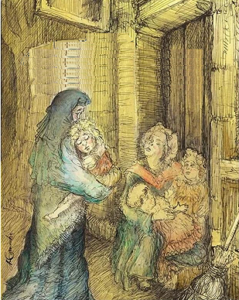
Arquivo para July 17th, 2024
Wisdom and simplicity
Among the various contemporary narratives, one of the most absurd is the praise of ignorance as if it were an ally of simplicity and humility, from the “cultural” to the religious world this is transformed into narratives: he did not attend college, he did not read a book, did not walk among wise men, etc. Do not confuse this with the ability to live simply and among simple people.
one of the most absurd is the praise of ignorance as if it were an ally of simplicity and humility, from the “cultural” to the religious world this is transformed into narratives: he did not attend college, he did not read a book, did not walk among wise men, etc. Do not confuse this with the ability to live simply and among simple people.
It’s not a sign of the times, it’s not “generational”, it’s just a lack of interest in true asceticism, in an inner and outer growth that gives your human nature that something more that is the only thing capable of removing depression, anguish, anxieties and other illnesses. current.
The wise man is an observer, and observes not only the everyday scenes, those that different types of people live in, especially the simplest ones, but also the one who searches in the history of humanity for those peaks of civilizational moments that made us more people, more human. and more supportively, there are many examples, authors and people who gave us this.
We posted yesterday about fresh water and hot food, but in several regions this has interesting contours and cultural aspects, for example, in many countries there is no breakfast, an African told me, in Portugal there is breakfast which is a breakfast. simple morning, and in Brazil what is called breakfast is actually a small lunch.
What to read beyond is of course your personal belief, read the Bible, the Quran, the Vedas or what is sacred or culturally read in a certain culture, the red book in China for example, the second most read book in Brazil is The little prince, although Paulo Coelho’s The Alchemist is 5th. in the world, but Iliad and Odyssey are still little read, King Lear and Othello by William Shakespeare are increasingly less known.
Of course, wisdom does not mean literary culture, but far from it it also becomes narrative in the sense that it ignores cultural history, the modern model of the novel is present throughout Western culture, and Honoré de Balzac and Gustave Flaubert are representatives for different tastes, but even for social criticism they should be read.
Someone can launch the philosophical argument, it is an entire Eurocentric culture, true, but it has been incorporated into everyday thoughts, nationalism through national colors is all over the world, freedom of expression, as the romantic Victor Hugo (Les Misarables (photo), in my opinion, the best of romantics said: “Not even a rule, nor models” is also an expression of individualism and personal heroism, but historical.
We made several posts about being, interiority and the complement of Contemplative Life with Active Life (Hannah Arendt and Byung-Chul Han in particular), about the methodology of the hermeneutic circle where we must listen to the text (and also the dialogues) for fusion of horizons and also the disaster of our Western culture and the need for resistance of the spirit.

